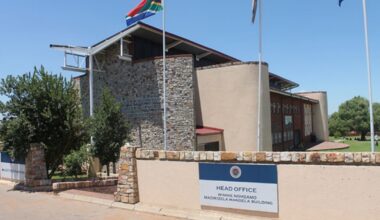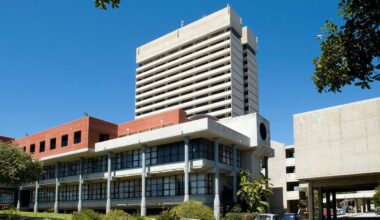A crucial aspect of the mining environment is the presence of mining schools. These schools specialize in geology, mineral processing, engineering, safety, and environmental management.
In terms of engineering, mining is a very interdisciplinary field that includes elements of environmental, civil, and mechanical engineering.
South Africa boasts many top mining sites, creating job opportunities for many. Getting a degree in mining is one of the best ways to position yourself for these opportunities.
There are many mining schools in South Africa you can enrol in. To make it easier for you to choose, we have curated the top 10 mining courses that can help you advance in your mining career.
Our article will also highlight the requirements you are expected to meet to be able to study any of these mining courses and the fee structure for mining courses in South Africa.
Table of contents
- Best List of Mining Courses in South Africa
- 1. Mining Engineering
- 2. University of Pretoria – Mining Engineering (BEng and MSc)
- 3. MSc in Mining and Environmental Engineering
- 4. MSc in Environmental and Energy Engineering (Mining Focus)
- 5. Mining Engineering (Diploma, Degree, and Certificate Programs)
- 6. The South African Institute of Mining and Metallurgy (SAIMM)
- 7. Mining Qualifications Authority (MQA)
- 8. Explosives Engineering for Surface and Underground Mines
- 9. Mining Machine Operator Course
- 10. Diploma in Mining at UNISA
- Mining Course Requirements in South Africa
- Mining Courses Fee Structure in South Africa
- Which job pays the most in mines in South Africa?
- How much do mine workers earn monthly in South Africa?
- Frequently Asked Questions
- Conclusion
- References
- Read Also
Best List of Mining Courses in South Africa
South Africa has lots of mining schools as well as many courses. Below is the top list of mining courses in South Africa.
1. Mining Engineering
During the first two years, you will study the fundamental sciences, technology, and skills that are common to all engineering specialities, including mechanical, electrical, and civil engineering.
In your third and fourth years, you will study mining engineering topics, such as ventilation, environmental engineering, mine and rock mechanics, and mineral resources appraisal.
You will apply your knowledge to design a mine and evaluate its economic viability and profit potential in a mine design exercise at the end of the program.
Duration: 4 Year
Read Also: Best Thekwini TVET College Courses | Fee Structure
2. University of Pretoria – Mining Engineering (BEng and MSc)
The Department makes its expertise available to members of industry for purposes of professional development, as well as skills development and capacity building.
These short courses, presented in collaboration with the Enterprises University of Pretoria, enable individuals in the mining sector to become more effective in the development of smart, long-lasting solutions for society.
The following are the courses available Blasting Engineering, Bow Tie Analysis Masterclass, Chamber of Mines Certificate in Rock Engineering (Paper 1 Preparation), Exam Preparation Programme in Rock Engineering (Chamber of Mines Paper 3.1), e.t.c
Duration: 4 years
3. MSc in Mining and Environmental Engineering
You will learn more about mining here. The course has a strong focus on mining and as well as environmental engineering to mining. Students are also exposed to mining laws and how the international market for mining works.
Duration: 4 years
4. MSc in Environmental and Energy Engineering (Mining Focus)
The department provides a comprehensive undergraduate curriculum in civil engineering that includes modern courses in all the classic areas of civil engineering, including transportation, water supply, wastewater treatment, mining, geotechnics, steel and concrete materials, and structures.
The Engineering Council of South Africa granted full accreditation to UCT’s Bachelor of Science (Eng) program in civil engineering making it one of the best mining courses in South Africa.
Duration: 4 years
Read Also: List of UKZN Courses in South Africa | Fee Structures
5. Mining Engineering (Diploma, Degree, and Certificate Programs)
The College of Science Engineering and Technology is committed to providing high-quality, reasonably priced, easily accessible, and pertinent science, engineering, and technology programs.
Therefore, through top-notch research, community involvement initiatives, academic and administrative staff, and systems, they provide creative delivery methods and processes that serve the large student body.
Duration: 4 years
6. The South African Institute of Mining and Metallurgy (SAIMM)
Following the development of the cyanide method, which saved the South African gold mining industry at the time, the Southern African Institute of Mining and Metallurgy (SAIMM) was founded as a learned organization in 1894.
The 125-year-old professional organization has connections domestically and abroad to help members stay informed about technological advancements in the mining, metallurgical, and associated industries.
The major goal is to ensure that engineers stay industry-relevant and can advance their careers while continuing to grow professionally.
A professional code of ethics that guarantees reciprocity with comparable entities worldwide also guides them. They offer courses that help professionals stay updated with the latest developments in the mining sector.
Duration: 4 years
The MQA is in charge of overseeing several programs for skill development. The goal of skills programs and leadership is to create a workforce that is educated and skilled, with abilities that are recognized and acknowledged according to the National Qualifications Framework (NQF).
This is to guarantee that the mining and minerals industry has enough skilled workers who will enhance production, promote employment equity, and improve health and safety.
Duration: 4 years
Read Also: Best 15 Software Development Courses in South Africa | Cost and Requirements
8. Explosives Engineering for Surface and Underground Mines
In addition to covering the basic elements of mining, safety, efficiency, and productivity, the course seeks to familiarize participants with the numerous commercial explosives and initiating systems that are available in South Africa’s mining industry.
Duration: N/A
9. Mining Machine Operator Course
Once an operator has mastered lifting and moving big goods, they are granted an operator license. Drill rigs, LHD scoops, roof bolters, utility vehicles, shuttle cars, and continuous miners are among the several mining machine types that can be examined.
The mining machine operator training academy provides theoretical, hands-on instruction, and safety measures to lower the danger of harm, death, or damage. Trained facilitators and assessors provide evaluations following the training.
Duration: N/A
10. Diploma in Mining at UNISA
The University of South Africa diploma in mining is among the best mining courses in South Africa. The course has many sub-skill sets in mining learners can immerse their selves in.
A diploma in mining at UNISA covers many curricula that expose learners to the core areas of mining as well as the corporate side of it.
Duration: N/A
Mining Course Requirements in South Africa
While university degrees in mining require a minimum of a high school diploma and good grades in science courses at school, vocational mining schools in South Africa puts little or no academic restrictions on enrollment in their short mining courses.
Mining Courses Fee Structure in South Africa
South African institutions have varying fee structures for mining courses. However, based on the obtained statistics, below is the average you will spend if you look at obtaining a mining degree or certificate in South Africa.
Short Courses and Certificates: ZAR 5,000 – ZAR 25,000
Diploma Courses: R 20,000 – 50,000
Undergraduate Degree (BEng or BSc in Mining Engineering): R 30,000 – R 60,000 per year
Postgraduate Degree (Masters or PhD in Mining Engineering): R 50,000 – R 100,000+ per year
Read Also: Top 10 Graphic Design Courses in South Africa |2025 Fee Structure
Which job pays the most in mines in South Africa?
Geologists, engineers, and mining managers are among the high-paying positions in the mining industry. The industry has a significant impact on the economy because it generates a lot of export income and jobs.
How much do mine workers earn monthly in South Africa?
At the beginning of their employment, mining and quarrying labourers usually make between R3 226 and R6 192 net each month.
This is between R4 163 and R8 506 a month for a 45-hour workweek after five years of service. Mining engineers, on the other hand, earn R 55,908 which rises with length of experience and some government policies.
Frequently Asked Questions
A medical certificate of fitness (Red Ticket) is a prerequisite, and learners must possess a Grade 10 certificate. The mines have learner training centres with state-of-the-art training apparatus.
Bachelors in Civil Engineering (Geotechnics and Underground Engineering)
The process starts with an R 100 application fee.
Mining engineers, mine managers, geologists, and other specialized engineers are among the many occupations in the mining industry that have the potential to pay more than others
Conclusion
Mining is a very lucrative industry in South Africa. Whether you intend to obtain a degree or earn vocational mining skills, there is always a job opportunity for you in the fast-growing South African mining industry.
A good number of the school has options for flexible payments to accommodate the applicant’s financial capacity.
Read Also: List of Rosebank College Courses and Fee Structures
References
- Mine Health and Safety Council – https://mhsc.org.za/
- The South African Institute of Mining and Metallurgy (SAIMM) – https://www.saimm.co.za/






